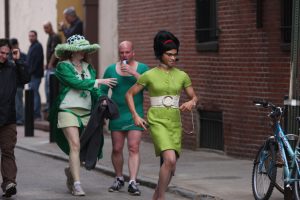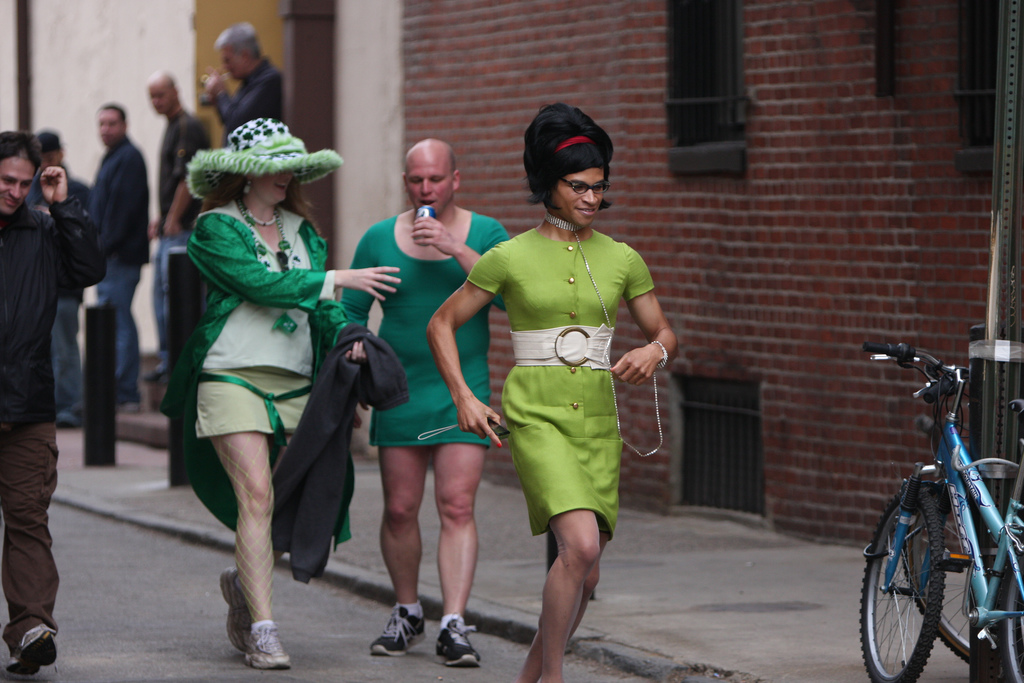Date Posted: May 21, 2011
Print Edition: May 13, 2011
By Sophie Isbister (The Cascade) – Email

Today, in a time when humankind is increasingly concerned with toeing the line and conforming to the status quo, there exists a certain set of people who choose to do things differently. This new mindset includes the thousands of people who travel yearly to mammoth party festivals such as Burning Man. It includes people who live on communes, people who dress like clowns on the weekend for fun, and people who get together with hundreds of strangers and go on pub crawls dressed as Santa Claus.
This new attitude for life, this thirst for behaving differently (and perhaps a little wrongly) isn’t limited to activities that don’t break a sweat. Hash House Harriers (or hashers) is an international group of running, drinking, and adventuring enthusiasts who meet to behave badly together. In groups large or small they play a variant of follow the leader. Known as the hare, the leader gets a head start with the map of the course they will run. Only the hare knows where they’re going, and he or she leaves clues and diversions in his tracks for the harriers and harriettes to follow. The prize at the end of the kilometres-long group runs? Ice cold beer!
Original Hash House Harriers were named so after a nickname that had been used to describe the Royal Selangor Club Chambers, a place that been the social hub for British civil servants and businessmen working and living in Kuala Lumpur in 1938 and up until the second World War. Hashing began as an unnamed and disorganized social running club based on English school hare and hound runs. It became a wildly popular club for the purposes of running off the previous night’s hangover, promoting physical fitness. Of course, equally important, it promoted “acquiring a good thirst and satisfying it with beer,” according to the original charter of the Kuala Lumpur Hash House Harriers.
After dying out during the war, hashing experienced a wild rebirth in popularity. Several more chapters of the Hash House Harriers opened throughout Southeast Asia, eventually spreading the craze overseas to Australia in 1967. Today at least 1700 chapters exist worldwide. The rising popularity of hashing, and the hedonistic personalities that the hashes take on, speaks to society’s need to let loose. Describing themselves sometimes as “a running group with a drinking problem,” hashing is a sometimes R-rated event for consenting and hilarious adults to let loose with friends, sing debauching songs, and just to be, more or less, silly – all while getting in some much needed exercise.
Hashing is entirely built on camaraderie. During the hash, participants are not called by their own names but by nicknames. Some nicknames in the Vancouver hash chapters include Low Blow, Aw Fuck It, Do Me First, Beheader, and the vividly imaginative Captain Hymen Grinder. “On, on!” the hounds (or pack) yell as they follow the path the hare sets out. They stop occasionally for a “beer check” to drink and chat while stragglers catch up. Most chapters prefer the hash to take place in nature, but there are urban hashes as well. Sometimes the path is pre-set days or hours earlier (dead trail), but more commonly in North America, hounds follow the hare (live trail). The goal is to catch the hare rather than finish the course.
Hashing is a collaborative event, open to anyone, for the express purpose of fun and hedonism (although some clubs focus more on the fitness aspect). Drinking, running, shouting, yelling, singing lewd drinking songs – hashers live life to the fullest, don’t stop for anyone, and refuse to live life with banality. We could all learn a thing or two from these brave souls as they stand up to the doldrums of life. On on!


